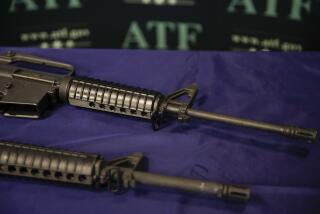Opinion: California is flooded with ‘ghost’ guns, and a new state law won’t fix it
- Share via
At the huge, carnival-like Orange County and Ventura County gun shows I attended recently, half a dozen vendors were offering imitation Glock semiautomatic pistol models — in pieces. The kits, which cost between $400 and $525, come in cardboard boxes containing steel barrels, plastic frames, and an array of small plastic and metal parts. Because the gun parts and kits are not finished guns, they mostly escape California’s gun control laws and, once assembled, have a feature that distinguishes them from manufactured weapons: no serial number. They are “ghost guns” — untraceable. The rise in popularity of these weapons in recent years has prompted new California legislation aimed at reining them in, but the market is far ahead of the new policies.
In California, ghost gun kits — at least the legal ones — mostly feature pistols. They must be put together before use, though the task doesn’t require sophisticated tools or skill. To assemble a pistol, the polymer frame, which includes the trigger housing, needs some plastic tabs shaved off and several holes drilled — a hand drill will suffice in steady hands — before it can accept the barrel and action and then fire. The plastic frame is called an “80% receiver” because it comes mostly, but not completely, manufactured.
Not only will the finished guns have no serial numbers, but the fact that they are sold in kits exempts them from laws requiring background checks and waiting periods. At the shows, when I picked up a completed Glock clone — called a “Glock-compatible” pistol — and showed interest in buying a kit, vendors always said something like, “You can go online and get your serial number from the CA Department of Justice before you start your build.” And each plastic pistol frame comes with a small stainless steel plate to engrave a serial number.
As of Jan. 1, 2019, I became legally obligated to call the state and get a serial number. But there is a loophole: Just as when I buy nuts and bolts at a hardware store, I can put down cash and walk out the door without anyone ever knowing my name. The Department of Justice has no idea I bought a parts kit.
Sending a wave of weapons without serial numbers or known purchasers out into the nation creates obvious dangers, and officials say the number of such guns has soared. In May, the public information officer at the Glendale regional branch of the federal Bureau of Alcohol, Tobacco, Firearms and Explosives announced that 30% of the confiscated guns in its vault were ghost guns obtained by agents in the course of criminal investigations.
Firearm advocates would be quick to point out that criminals constitute only a small portion of the market for gun kits. They are also purchased by hobbyists and gun collectors who like building things and by 2nd Amendment advocates who want to uphold what they believe is their constitutional right to own firearms without serial numbers or paper trails. Many of them feel it’s prudent to own firearms untraceable by the government in case liberals try to confiscate all combat weapons in private hands.
It’s hard to know how many ghost guns exist, as sellers aren’t required to keep records. Mark Tallman at Colorado State University, who studies such weapons, estimates that based on the number of large-scale online sellers for the last few years, there are at least several hundred thousand ghost guns across the nation. The ATF regional branch in Glendale declined to say how many it has seized and the ATF national headquarters has not yet responded to a Freedom of Information Act request for the number of ghost gun seizures across California.
No national consensus exists on how such weapons should be regulated. New York and several other Northeastern states have simply outlawed their sale or purchase. California recently enacted Assembly Bill 879, which tries to balance concern over the potential criminal use of ghost guns with the legitimate interest of hobbyists. California’s new ghost gun law treats ghost gun kits more like actual firearms. Parts can be bought only through licensed dealers in face-to-face transactions. Parts bought over the internet must be shipped to a licensed dealer to close the deal, and sales between private parties must also go through a licensed dealer. A purchaser must be at least 21 years of age and pass a state background check.
However, parts of the law won’t take effect for years. Dealers who sell precursor parts will not even need licenses until July 2024. And background checks for individual purchasers of precursor parts will not go into effect until July 2025. Even after the law goes into effect, preexisting guns without serial numbers will remain hard to trace. And some new guns made from parts will likewise be difficult to trace. Not everyone will apply for a serial number even though it’s legally required. The people who buy a given model of precursor part but who do not call and get a serial number can be identified, but it will still take time to trace a particular gun.
AB 879 is a good first step, but it must be regarded as only a starting point. We will need additional legislation, and before we do anything, we need better numbers. Federal and state agencies should regularly disclose what data they possess about ghost guns so that policy can be better tailored to address the problem. Once we generate better estimates about the scope of the ghost gun problem, then we can determine what to do next.
James William Gibson is the author of “Warrior Dreams: Paramilitary Culture in Post-Vietnam America.”
More to Read
A cure for the common opinion
Get thought-provoking perspectives with our weekly newsletter.
You may occasionally receive promotional content from the Los Angeles Times.










